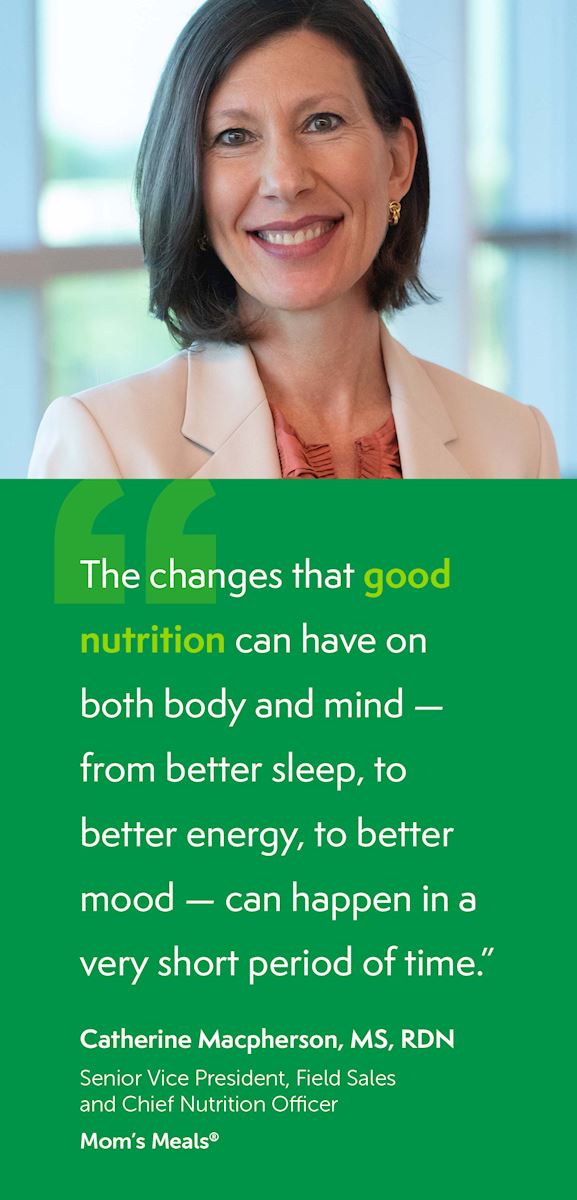From seeking services, to managing care, to developing safe, healthy and enriching daily routines, the lives of those caring for loved ones with IDD are busy and often stressful. It’s been gratifying over the years to hear from our many customers who choose Mom’s Meals® to make each day a little easier and nutritious for themselves and their families. We’re grateful to play a role in supporting people living with disabilities with our variety of menus — including our pureed meals — to enhance well-being and preserve independence.
There are more than seven million Americans living with an IDD in America. IDD includes many conditions, often presenting at birth and developing by early adulthood, that affect the person’s intellectual, emotional and/or physical development. Quality nutrition is important in supporting individuals with an IDD, and medically tailored meals are an effective tool.
These disabilities can affect several different parts or functions in the body and include cerebral palsy, Down syndrome and Fragile X syndrome. People with an IDD can experience a range of impairments from vision and hearing loss to intellectual and psychiatric disabilities. It’s common for people with developmental disabilities to have additional health issues including dysphagia and chronic illnesses.
IDD challenges
Supporting someone with an IDD is complex. It starts with understanding their needs, learning about their ability to manage activities of daily living (ADLs) and then selecting support services that match their needs while also honoring the individual’s autonomy and preferences.
Health challenges
ADLs are complicated by health challenges many people with an IDD face. Research shows many individuals with an IDD:
- Experience shortened life expectancy and poor health outcomes
- Are less likely to receive preventive care
- Experience chronic disease such as diabetes and heart disease at higher rates than the general population
- Live with dysphagia (difficulty swallowing, eating and drinking)
Economic challenges
Individuals with an IDD also experience higher exposure to factors that can adversely affect overall outcomes for their well-being. These include lack of transportation, higher health care costs and financial constraints due to low paying jobs.
Nutrition and food insecurity
These challenges are barriers which make it harder for those with an IDD and their caregivers to access the support they need, even the essentials, like getting enough nutritious food. In 2021, households that included people living with a disability were twice as likely to struggle with food insecurity.
Food as medicine provides support
One important way to support people with an IDD and their caregivers is improving access to good nutrition through medically tailored home-delivered meals, nutritional education and nutritional counseling.

- Food as medicine — Nutrition has the proven power to help heal, prevent and manage chronic disease. Providing medically tailored meals is especially helpful for people with an IDD who have chronic conditions because it takes the guesswork out of getting the proper nutrition. Special meal formulations, such as pureed foods, also help people who have dysphagia get the nutrition they need. Without it, complications can occur, such as dehydration and malnutrition.
- Encourage independence — Some people with an IDD can live independently and manage some ADLs. Home-delivered meals make independent living easier by removing the more time-consuming and complicated tasks of meal planning, shopping and preparation.
- Preserve dignity — Nutritious, delicious food is central to quality of life for everyone. By providing appealing, condition-appropriate food options to someone with an IDD helps respect their preferences and supports their dignity through the power of choice.
- Support caregivers — Many individuals with an IDD live at home and depend on family members for care. It can be physically and emotionally demanding. That’s especially true as caregivers age. There are nearly one million households in the U.S. where an adult with an IDD lives with an aging caregiver. Providing medically tailored, home-delivered meals for those with an IDD ensures good nutrition and is one less thing for the caregiver to manage. Home-delivered meals are also useful for caregivers themselves to help ensure they are getting the right nutrition to keep up their strength.
Mom’s Meals can help with person-centered nutrition
With nine-condition specific menus designed by registered dietitians, we help individuals and their caregivers manage their unique nutritional needs. To accommodate the nutritional needs of individuals living with dysphagia, Mom’s Meals offers a pureed menu of soft food meals. Our pureed menu options have all been designed to meet the Academy of Nutrition and Dietetics requirement for Dysphagia (Level 1 - Pureed Nutritional Therapy). Meals are intended to meet the guidelines of level 4 - pureed of the International Dysphagia Diet Standardization Initiative (IDDSI) Framework guidelines.
Mom’s Meals is the leading provider of comprehensive food as medicine solutions with published improved health outcomes that drive lasting change. This includes fully prepared, refrigerated, medically tailored home-delivered meals delivered to any address nationwide, nutritional counseling, other forms of nutrition support and personalized engagement. These solutions are provided through Medicaid or Medicare Advantage health plan benefits or for direct purchase. At Mom’s Meals, our mission is to improve life through better nutrition at home through our long-term care, condition management, post-discharge and food insecurity programs.
Some individuals may qualify for government or health plan assistance and have Mom's Meals delivered at little or no cost. Find out more.




